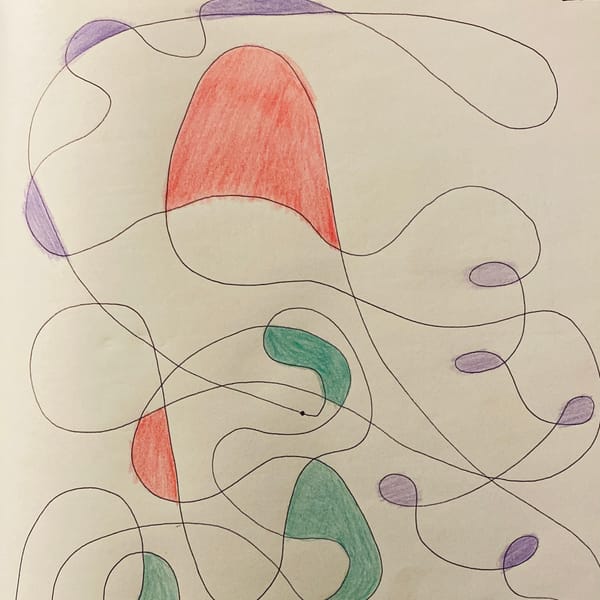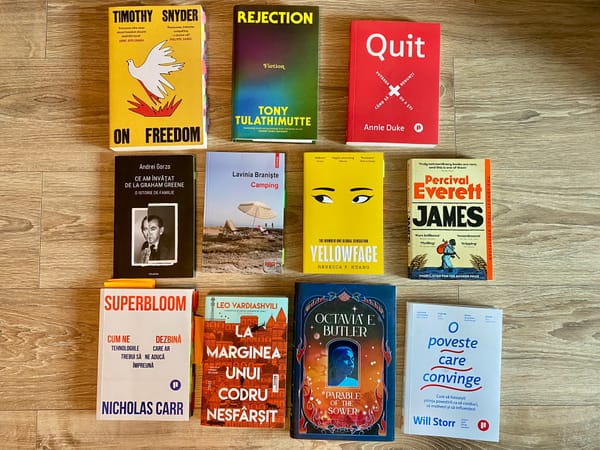Draft Four: Did I fail my (immediate) future self?
New season of tackling old patterns.

This is my first letter on Ghost. I made the switch because I don’t like how Substack is evolving. I hope this lands in your inbox with as few glitches as possible. Let’s take it a sign of new things that come with a new season, even though the world hardly feels like a joyous place that embraces restarts. It’s more like, outside it’s Fall and inside we’re falling.
*
I thrive on the energy of autumn months, yet I also feel stuck. Draft Four is partly a chronicle of settling into a new phase of life, and so much of it has been feeling like Groundhog Day. It’s two years ago that I moved into a new place, and it still feels like a short-term rental. I am seeing apartments these days – finding a newish building to move into isn’t easy – and part of me is “shouldn’t this have happened sooner?”
I’m also annoyed at the cash flow nightmare at work. Our NGO rekindled about a year ago, and it’s already shaky. Shouldn’t I have seen this coming?
I know enough to understand this is negative self-talk, fueled by insecurity and perfectionism. The facts behind any of the things above aren’t destiny, but that doesn’t make my annoyance less real.
In short, I feel I failed at the project of my own future, at least at the future I was furiously sketching out a couple of years back. Which is why I decided that for this week’s letter I will go back in time and resurface some writing on failure and self-sabotage to open up room for hope, even when it feels there isn’t any.
What follows are largely rewrites from the summer of 2023.
*
We’ll start with “failure” – a necessity that can’t be avoided, as Costică Brădățan argues in In Praise of Failure: Four Lessons in Humility:
“Failure is whatever we experience as a disconnection, disruption, or discomfort in the course of our patterned interaction with the world and others, when something ceases to be, or work, or happen as expected. (…) And such a state is the best starting point for any journey of self-realization.”
Yup. Definitely what I’m experiencing.
Brădățan’s book chronicles the forms of failure that shape us. The first is physical failure – of the body, but also of things. The second is political failure, of our never-ending supply of utopias. Then, social failure. And, inevitability, biological failure.
“A world where things perform their proper function is a hospitable place”, he writes about physical failures. Planes take off and land safely, your coffee machine turns on in the morning, the internet connection works when you join your remote meeting. We like our worlds like this – it makes them reliable and predictable. When they are not, we are anxious.
Political failure is one I’ve become increasingly terrified of. “History – the only true guide we have on this matter – has shown us that true democracy is rare and fleeting”, Brădățan writes. “It flares up almost mysteriously in some fortunate place or another and then fades out just as mysteriously.”
In truth, democracy, debate, dialogue, are boring. Authoritarians are exciting and they feed on our worst instincts. They promise utopias (just look around), and, more often than not, utopias deliver terror. That’s because they ask us to be perfect citizens, and if we’re not, the state will eliminate us. Our crisis is exacerbated by us demanding that our fellow humans be just as spotless and perfect and in alignment with our views. “Democracy fails”, argues Brădățan, “when it doesn’t make enough room for failure – when people can’t help seeing themselves as better than they really are. Which is most of the time.”
The idea of a common project where we demand and create less suffering for others is the opposite of what digital discourse is serving up. What if we were humbler and more forgiving of our own failures and of the failures of others? Brădățan:
“If we managed just [less suffering], we would accomplish a great deal. For less is so much more. Some of the most ambitious moral reformers, from the Buddha to Saint Francis of Assisi, asked nothing more of us: just show less greed, less self-assertion, less ego. Instead of talking endlessly about making the world a better place – usually an excuse either to do nothing or to wield power over others – we should perhaps try a little harder and make the world a less horrific place. A tall task, no doubt, but one worth trying.”
Many of us want to live in a better world. We also want to become better versions of ourselves.
Future You has a problem of dependency – they largely become what Present You does. And most of the time, Present You just doesn’t do what Future You needs to thrive. There’s a Seinfeld bit about this. “Night Guy wants to stay up late. ‘What about getting up after five hours sleep?’ ‘Oh, that’s Morning Guy’s problem. That’s not my problem, I’m Night Guy.”
Think about it: you keep dreaming of a time when Future You will have an empty calendar to focus on what matters, but Present You keeps scheduling things – “coffee meeting in the middle of the day, three weeks from now? Sure!”
You want Future You to be fitter (and not get terrible cholesterol results), but then Present You keeps finding reasons for “Cheat Day” or “it’s schnitzel with mashed potatoes week!” (Ok, this is me).
Your Future Self by Hal Hershfield goes through a lot of the research about how we keep failing at planning for the future. For example: when people are given the option of “choosing between thirty dollars in eight days and thirty-four dollars in seventeen days, people opt to wait for the larger reward. But when one of the rewards is available now – say, thirty dollars right away versus thirty-four dollars in nine days – then the preferences reverse”.
Same with food – when choose among multiple eating options a week from now, they choose the healthier thing. When they choose for now, they go for junk food.
“When choosing for our future selves”, Hershfield writes, “we choose the banana. But when the present self gets involved, we end up gorging on chocolate. This sort of behavior – which is known as extreme discounting of future rewards – is associated with and even in some cases predictive of behaviors that many of us wish to avoid.”
I’ve been complaining about my 85 kilograms and the belly that comes with them for years, but I can precisely chart their arrival: more stress and more work meant less bandwidth for exercise and wise food choices, which meant more mashed potatoes and schnitzel (what?!), plus more chocolate to replace the glucose we burn daily while making decisions and task switching.
*
I’m not saying we shouldn’t reward ourselves. Let’s!
What Hershfield does is to remind us is how tough it is to make better decisions for the future: the present is more emotionally charged, more immediate, and who the hell is that Future Me person anyway? Screw them.
This is the crux of it: the more we treat our Future Selves as Others – people we don’t know and can’t understand – the more we’ll actively sabotage them.
“If we can treat those distant selves as if they are close others – people we care about, love, and want to support – then we can start making choices for them that appreciably improve our lives now and later”, Hershfield writes. He goes on to quote a handful of research that shows the more similarity people see between their current and future selves, the more likely they are to save, exercise, and choose more ethically.
You can’t know who you’ll be, let alone what you’ll feel and think about in the future. Buy you can embrace who you’ll be with love, despite the uncertainties. Here’s a few ways to do that:
- Accept your faults. “You need to genuinely accept responsibility for your past self’s mistakes. The dining room table isn’t cluttered because of those moon cycles, or because I’ve been too busy with other chores. It’s cluttered because I chose to avoid it. It’s my fault.”
- But also be understanding and kind to yourself. You avoided chores, created clutter, played hours of Football Manager because other things that week were tough. You know what purpose the “cheat days” served. Now clean up that table.
- Stop aiming for Instagram-like bliss – more and more we try and aim for prioritizing our needs and desires in a self-guided attempt to “maximize happiness”. But life is always a mixed bag of actions we control and shit we don’t control.
- Understand that procrastination is a way of avoiding unpleasant feelings. Also this: when you delay something for “some other time”, you mistakenly assume Future You will be better skilled to do it, or in a better mood. Most likely, that’s false.
- Break actions into their smallest components. Beginning reporters often freeze in front of an assignment because they keep picturing the future published article. But that’s not the smallest next action – that could be making a list of five people you want to interview.
- Write letters to your Future Self or have your Future Self report back. Artist Debbie Millman has perfect this exercise into a “Ten-Year Plan for a Remarkable Life” – a story you can write about what your life is like 10 years into the future.
*
A few things worth pointing out.
Number one: thinking about Future You and acting upon it is a privilege. Much research has been done on how scarcity impacts our bandwidth and it’s why people in poverty can’t plan for the future; the brain is literally too busy with surviving in the present to do that.
Number two: this is not just an individual problem. Arguably, planning for the future is what our organizations and leaders should be doing more of. Many of our present problems are because an organization or a handful of leaders had a lack of long-term thinking in the past.
Number three: The past often makes for a terrible future.
That’s what I took away from reading Georgi Gospodinov’s novel Time Shelter (Refugiul timpului in the Romanian translation). The book won the 2023 International Booker Prize and chronicles experiments that allow people to live in the past: first, it’s Alzheimer’s patients living in spaces decorated and populated according to their favorite historical time. Then it’s nostalgics spending time in 1960s living rooms or recreating memorable moments from the 1990s. Then it’s entire countries who decide to run referendums to turn back the clock to their supposedly “best decade”.
As the novel progresses from quirky to gloomy, its characters increasingly view the past as our only safe destination. We’ve been there. We enjoyed it. It made us who we are. Let’s return.
Gospodinov sees our abandonment of the future: “The time is coming when more and more people will want to hide in the cave of the past, to turn back. And not for happy reasons, by the way. We need to be ready with the bomb shelter of the past. Call it the time shelter, if you will.”
He mostly looks at Europe, at the rise of nationalist and nativist and reactionary elements, and, in their light, his fictional idea of organizing referendums to return to the past is not preposterous. After all, if the present is shitty, the future couldn’t be much different, right?
“If anything is certain, it’s the past. Fifty years ago is more certain than fifty years from now. If you go two, three, even five decades back, you come out exactly that much ahead. Yes, it might already have been lived out, it might be a ‘secondhand future’, but it’s still a future. It’s still better than the nothingness yawning before us now. Since the Europe of the future is no longer possible, let’s choose a Europe of the past. It’s simple. When you have no future, you vote for the past.”
Today there is little appetite for the future.
People are asking for – and voting for – time shelters.
We’re sick of feeling like we belong to failed societies, living failed lives.
*
I feel this, too. And yet I don’t want to return to the past, because I believe the future can be better. That’s my hope. I am hopeful about us, and our possible futures. “To hope is to give yourself to the future”, Rebecca Solnit writes in Hope in the Dark, “and that commitment to the future is what makes the present inhabitable.”
Hope in the Dark is one of my favorite future-oriented manifestos, because it doesn’t define what’s next as a result of dreams, prayers, or channeled energy. On the contrary, Solnit places the hopeful in a special category. Optimists, she says, think it will all be fine without our involvement. Pessimists think it’ll never be fine. Although these are divergent positions, they both excuse themselves from acting. The hopeful? They act.
“Hope just means another world might be possible, not promised, not guaranteed. Hope calls for action; action is impossible without hope.”
SIDE DISHES:
- A scheduling note: because I’m on my much delayed vacation in two weeks, the next Draft Four will arrive on the first Sunday in October.
- Along with my colleagues we’ll be sharing news about next March’s The Power of Storytelling soon, so follow us. While on Instagram, check out Prea Sărac – we’re still in teasing-mode for our podcast on precariousness, but it’ll launch in about a month.
- This essay on perfectionism by Leslie Jamison is soothing and anxiety-inducing at the same time. So is this podcast on asking for money for one’s work. (Yes, payments for Draft Four remain suspended; I’ll be back with news in the next edition).




